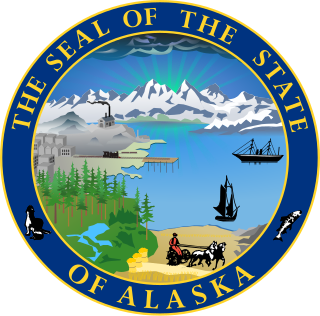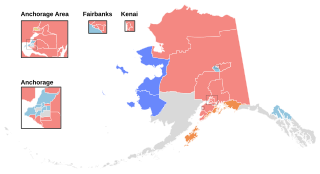
In social choice theory and politics, a spoiler is a losing candidate who affects the results of an election simply by participating, a situation that is called a spoiler effect. If a major candidate is perceived to have lost an election because of a minor candidate, the minor candidate is called a spoiler candidate and the major candidate is said to have been spoiled. Often times the term spoiler will be applied to candidates or situations which do not meet the full definition, typically in real-world scenarios where the introduction of a new candidate can cause voters to change their opinions, either through their campaign or merely by existing. A voting system that is not affected by spoilers is called independent of irrelevant alternatives or spoilerproof.

Mark Peter Begich is an American politician and lobbyist who served as a United States senator from Alaska from 2009 to 2015. A member of the Democratic Party, he served as mayor of Anchorage from 2003 to 2009.

The Borda count electoral system can be combined with an instant-runoff procedure to create hybrid election methods that are called Nanson method and Baldwin method. Both methods are designed to satisfy the Condorcet criterion, and allow for incomplete ballots and equal rankings.

Since becoming a U.S. state in 1959, Alaska has been entitled to one member in the United States House of Representatives. The representative is elected at-large, because the state has only one congressional district, encompassing its entire territory. By area, Alaska's congressional district is the largest congressional district in the United States and the third-largest electoral district represented by a single member in the world. It is exceeded by the Yakutsk district in Russia and Nunavut in Canada.

The Alaska Democratic Party is the affiliate of the Democratic Party in Alaska, headquartered in Anchorage.

The 2008 United States Senate election in Alaska was held on November 4, 2008. Incumbent Republican U.S. Senator and former President pro tempore Ted Stevens ran for re-election for an eighth term in the United States Senate. It was one of the ten Senate races that U.S. Senator John Ensign of Nevada, the chairman of the National Republican Senatorial Committee, predicted as being most competitive. The primaries were held on August 26, 2008. Stevens was challenged by Democratic candidate Mark Begich, the mayor of Anchorage and son of former U.S. Representative Nick Begich.

Ranked-choice voting (RCV) can refer to one of several ranked voting methods used in some cities and states in the United States. The term is not strictly defined, but most often refers to instant-runoff voting (IRV) or single transferable vote (STV), the main difference being whether only one winner or multiple winners are elected.

Mary Sattler Peltola is an American politician and former tribal judge serving as the U.S. representative from Alaska's at-large congressional district since September 2022. A member of the Democratic Party, she previously served as a judge on the Orutsararmiut Native Council's tribal court, executive director of the Kuskokwim River Inter-Tribal Fish Commission, Bethel city councilor, and member of the Alaska House of Representatives.

The 2022 United States Senate election in Alaska was held on November 8, 2022. Incumbent Republican senator Lisa Murkowski won reelection to a fourth full term, defeating fellow Republican Kelly Tshibaka and Democrat Patricia Chesbro.

The 2022 Alaska gubernatorial election was held on Tuesday November 8, 2022, to elect the governor of Alaska. Incumbent Republican governor Mike Dunleavy won re-election to a second term, becoming the first Republican governor to be re-elected to a second term since Jay Hammond in 1978 and the first governor, regardless of political affiliation, to be re-elected to a second term since Tony Knowles in 1998.

The November 2022 United States House of Representatives election in Alaska was held on Tuesday, November 8, to elect a member of the United States House of Representatives to represent the state of Alaska. Democratic incumbent Mary Peltola won re-election to a full term in office, defeating Republicans Sarah Palin and Nick Begich III and Libertarian Chris Bye in the runoff count.

The 2022 Alaska Senate elections took place on November 8, 2022, with the primary elections being held on August 16, 2022. State senators serve four-year terms in the Alaska Senate, with half of the seats normally up for election every two years. However, because most districts were greatly changed in redistricting, elections were held for 19 of the 20 seats; the only exception is District T, represented by Democrat Donny Olson, which was mostly unchanged in redistricting and thus did not have an election. Some senators were elected to serve four-year terms, while others would serve shortened two-year terms.

The 2022 Alaska at-large congressional district special election was held on August 16 to fill the seat left vacant after the death of Republican incumbent Don Young. Mary Peltola was elected in a 3-way race against former governor Sarah Palin and Nick Begich III in the election, becoming the first Alaska Native and woman to represent Alaska in the House.

A final-four or final-five primary is an electoral system using a nonpartisan primary by multi-winner plurality in the first step.

The 2022 Alaska state elections took place on November 8, 2022. The state also held Regional Educational Attendance Area (REAA) elections on the first Tuesday in October.

The 2024 United States House of Representatives election in Alaska was held on November 5, 2024, to elect a member of the United States House of Representatives to represent the state of Alaska from its at-large congressional district. The election coincided with the 2024 U.S. presidential election, as well as other elections to the U.S. House, elections to the United States Senate, and various other state and local elections.

The 2024 Alaska House of Representatives election took place on November 5, 2024, as part of the biennial United States elections. All 40 seats in the Alaska House of Representatives were up for election.

Center squeeze is a kind of independence of irrelevant alternatives violation seen in a number of election rules, such as two-round and instant runoff, for example. In a center squeeze, the Condorcet winner is eliminated before they have the chance to face any of the other candidates in a one-on-one race. The term can also refer to tendency of such rules to encourage polarization among elected officials.

Alaska Ballot Measure 2 was a ballot initiative that was voted on in the November 5, 2024, general election. The ballot measure narrowly failed to pass.

The 2026 United States House of Representatives election in Alaska will be held on November 3, 2026, to elect a member of the United States House of Representatives to represent the state of Alaska from its at-large district. The election will coincided with other elections to the U.S. House, elections to the United States Senate, and various other state and local elections. Pursuant to the Constitution, Primary election will be held on August 18, 2026.


















